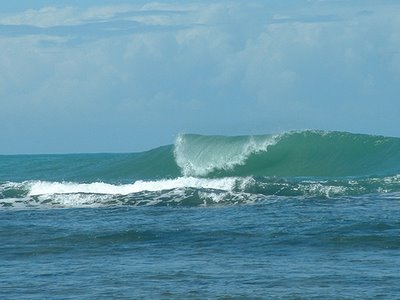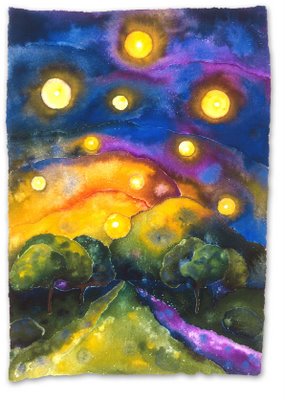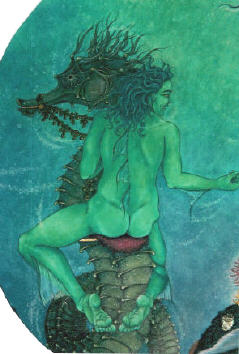Speaking in Blue Tongues

“Donna del miue paratge”
2005
Messenger, leave in the morning.
The voyage won’t be long.
To my friend in his own far land
carry now this song.
Tell him I’ve very happy
with the words he said to me
after he’d given me a kiss
beneath the canopy.
-- Anonymous song of a lonely lady,
c. 1200, sung by a woman who called
herself a great lady, donna del miue
paratge. (Jack Lindsay, The Troubadours
and their world)
The greater half of my
verse faith crosses,
like the sea,
to your white shores
where you sing
forever waiting for me
to return and find
you ready and willing
to begin at last,
after all lives.
Queen of beaches
like a pale white valve
to all blue heights
and depths, I hear
your song best at
the lonely hour
I spend boarding
ache and fret
on paper dragon ships,
dispatching my love
on that courier tide
that circles globes
and hearts, my longing
shipped to you and
yours returned to me.
I doubt we’ll ever meet
but this correspondence
is an old & deep affair,
our missives long
stained black by
dolphin foam,
old passions brewing
brine and brimstone
in the ink amid the
gentler ichors of abyss,
the orchid fragrance of
one remembered kiss
in that bower we both
stumbled on and
then stumbled through
each other, yearning
for whatever younger people
mistake for fire. The
bed we’ll share again
may shore in death, or
lives like every isle yet
to be found: suffice
here now that I heard
a high and distant sound
inside the winds now
blasting hard down from
the north, a pink
tongue for all their
teeth revealed. Heard you,
great lady, in that chambered
room inside the conch
I lifted on my morning
rounds here, down from
my great white writing chair:
Heard the voice which rules
the greater half of
the wild world
beneath the leagues of blue,
song of my soul’s unvanquished
ache to sing the depths of you.

SALTY GRAMMAR
2003
I am her berry O-mouth,
her silvering tongue,
blue grammarian
of the salt-tiding blue:
I turned and touched
her on some foreign
night, and she began
to sing, up from
the throat of my
every heaven-flung
nerve. Sing she did,
ever louder as
some woman smiled
and bid me mount
and ride wave
dazzle to the moon,
each foaming plunge
a construct of
arch and ache,
each stout article
of my faith
received in her
voweled sighs, her
Os and Ahs,
her sibilant, soft
Yes ... And so she
wrote her blue flamelets
down in the burning
book whose leaves
were torn from my
mind and heart and
balls; wrote them
down loin for line
in a wavelike sine
from one white startle
to the next, bed
to bed a voyage
like ravening, her
thirst the moon
hung high in the
window, gleaming
one white road
through all that
blackening blue.
She wrote the story
down and called
it my life, a
saltier hagiography
than I would choose
to write, but hey!
I am just the
hand in her
scriptorium,
transcribing the
next song, dipping
this pen into
her dark and then
scratching for a while.
She works out the
genitives, the syntax
and style of the
tale told so. My job
is just to chord
the mordents and
mellifluents of
her faux-angelic ire,
a vocalissimus
of beachside wonder
one poem short
of the surf’s one choir.

BLUE RHETORICS
2003
We have seen that the fili
Amargin is also represented
in the Leabhar na Gabhala
as reciting a set of rhetorics
immediately on landing
in Ireland.Presumably,
therefore, he had acquired
them elsewhere.
-- Nora Chadwick,
“Imbas Forosnai”
I am the wind that blows upon the sea;
I am the ocean wave;
I am the murmur of the surges …
-- from “The Song of
Amergin,” attr. to
Taleissin
She held my face
in her white hands
that night and
as I slept the
sea slipped into
me, wave after
wave after wave,
filling me with her
wild curvature.
Ah how I drank
Her as I slept,
free at last from
a long drought
of driest words,
her level rising
topmost in my brain.
When I woke
my eyes flew open
and my mouth
began to move,
spilling blue rhetorics
which to this day
I don’t understand,
just sing. It was as
if my tongue had
been pickled in
sea brogue, a
language both
so bitter and too
sweet, its numens
full of beach
bosomage spilling
wavelike from
their brilliant cups.
Cups I would drink
more than my fill
of if I could, but
I was already drowned
and washed back
to that shore where
She was every
wave’s farewelling
kiss, dissolved
and trailing back
to mute eternity.
The words could
only phrase what
never quite got
said between the
plunge and drying
spume, a low echo
of the sea’s wide
weeping when each
night the moon hauls
free a million miles
from Her womb.
I too must sing
in those blue
rhetorics, my tongue
now not of fire
but of the sea.
One day I woke
two thousand miles
north of that sea
I was once baptized
in, reborn to the
God who quells and
purifies Her primal
rough and raucous
ire: My eyes opened
and I saw then
not Him but Her,
curled close to me,
her shape the receipt
of all that foaming
wave which crashed
over me pregnant
with rooms He
might name but
never roam. My
mouth began to
move in ways
never again quite
my own, cerulean
and hooved, professing
a history dredged
up from the abyss,
old lost still gleaming
portents which are
worthless inland
or upstairs, a mother-
of-pearl inlay which
fades to blue
if you stare too hard.
Yet each saying here
rows me further back
to home -- so many
years after that
drowning embrace,
more years down
the road from that
first embracing wave,
so long as to lose
both her and history
to this blue argument
which still washes
wavelike from this
hand and now fades
in a drawling,
shorelike, rhetorical hiss
-- her voice inside
my own, a sea
inside the poem.

BOOTY
2003
What did I keep of her
all those lost or stolen nights
when she took me home
and bid me swim
her naked blue? Sights --
pale revealings and the
shock of sheer nature:
Beachside motions as
I pinned her and she
my mine, all curve and
wave and fatal crash:
Three words she
whispered just before
dawn which sank so low
in my ear I can’t repeat
them here, though all
I say is a toil and toll
and vintage of them.
I see those hours a
fraudulent, pale vicars
of a drowning faith
that nearly damn killed
me til I found a home
at last. Now I sometimes
wonder if the booty
I brought back was
just the darker
blue insides of my
own too-hot heart,
the part where she
always resided. There’s
a mirror she once
looked into lying on
an altar far below,
the portrait of a gaze
over my shoulder at
the love she could not
find that damned and
boozy night where
we both made off
with booty -- silver cups
we spilled so utterly
which still gleam
bluish white inside us,
visible only on moony
nights when the
sea we call the heart
is calmed to glass.

WOMAN ON MY LIPS
2004
Affection! thy intention stabs the centre
Thou dost make possible things not so held,
Communicat’st with dreams; -- how can this be?--
With what’s unreal thou coactive art,
And fellow’st nothing.
-- Shakespeare, The Winter’s Tale
I was the greater fool
who thought you breathed
and pined for me on
that bed I reeled to reach.
Walked too many miles
down that broken shore
alone, my voice more naked
than the white sands
of that beach, my song
more blue than the surf
that spring day I swore
to find you. As if real
breakers could dissolve
the vanish in your curves!
Or that some wavelike
passion raised your
stabbing nails of sweetness
back from that dead terrain
where I had heaped, like
corpses, all the nights
I couldn’t find you
where my heart
swore you reclined. What
I’ve salvaged from
my ruination in a trope
is that your initmacy
is pure intimation,
the lucency beyond
each fragrant
kiss, a surflike hiss
expiring into that
which no clench may
ever fully crash and
recede, alike as loaves
and fishes in the
miracle of that love
no love may fully kiss.
You aren’t an untouched
body but my embodied
reach from this shore
toward a mythic strand
where every Yseult
rouses her half-drowned
sea-weedy man,
my ache’s Tristanning
which shipwrecks
all purpose in one
unmanning wave and
leaves me where
no compass sail or
rudder of my mind
can ever find. You
aren’t the wings but
their necessity, the
sweet hot flash
inside the insdes
of fused loins. Yours
is the gaze which
in passing pierces me
then is gone,
leaving me to figure
out who’d read my
name then tossed it
back, hot for bigger
game. Your absence
is the pure invitation of
every inward-swinging
door; your smile the
length of that always
self-evicting digression.
What remains to say
of you is unsayable
in this poem and
so fragrant and
flagrantly blue
in the the next,
where surely I’ll
beach at last
on your apple island
where all is
pale and pearly pink
to death and you
are all I cannot name
much less conclude,
and all I ever wished
for with my face flat
in the aching well,
the woman on my
lips whose name
I can’t recall, beckoning
inside the next wave’s
bright booming farewell.
















